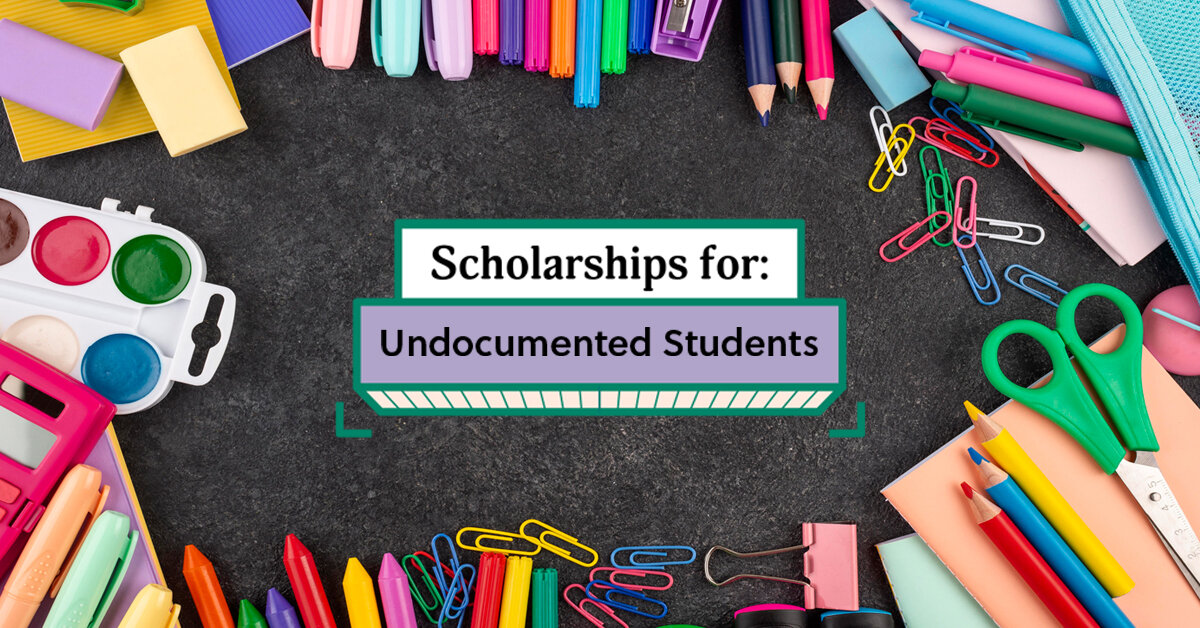Scholarships for undocumented students represent a lifeline, offering access to higher education and brighter futures. These scholarships, often merit-based or need-based, are crucial in overcoming significant financial barriers that undocumented students face. Securing funding can mean the difference between pursuing a degree and foregoing educational opportunities, ultimately impacting their long-term prospects and contributions to society. This exploration delves into the intricacies of accessing these vital resources, highlighting eligibility criteria, application processes, and available support networks.
The landscape of financial aid for undocumented students is complex, but understanding the available options and navigating the application processes effectively can significantly improve their chances of success. This guide aims to illuminate the path towards higher education for this deserving population, offering practical advice and valuable resources.
Eligibility Requirements for Undocumented Student Scholarships
Securing financial aid for higher education is a significant hurdle for many students, and this challenge is amplified for undocumented students who often face limited access to federal aid programs. However, numerous scholarships specifically designed to support undocumented students exist, each with its own set of eligibility criteria. Understanding these requirements is crucial for successful applications.
Common Eligibility Criteria for Undocumented Student Scholarships
Many scholarships for undocumented students share common eligibility requirements, although the specifics can vary considerably. Generally, applicants must demonstrate financial need, maintain a minimum GPA, and be enrolled or accepted into an accredited college or university. Some scholarships may also prioritize students pursuing specific fields of study or those who have overcome significant obstacles to achieve their educational goals. Geographical restrictions, such as residency requirements within a specific state or region, are also common. Finally, many programs require applicants to be currently enrolled in high school, pursuing a post-secondary education, or already attending college.
Comparison of Eligibility Requirements Across Different Scholarship Programs
While the core requirements mentioned above are frequently found, the specifics differ widely between scholarship providers. For instance, the minimum GPA requirement might range from a 2.5 to a 3.5 or higher. Some scholarships may only consider students with exceptional academic achievements or leadership qualities, while others prioritize students with demonstrated community involvement. The financial need assessment may involve reviewing family income, assets, and other relevant financial information. Some scholarships might only support students pursuing STEM fields, while others might have no such restriction. The residency requirement might range from state-specific to national, or even international, depending on the funding source and the organization’s mission.
Required Documentation for Undocumented Student Scholarships
The documentation needed for these scholarships typically includes proof of enrollment or acceptance into a college or university, transcripts showing academic performance (including GPA), and evidence of financial need. This evidence might include tax returns, bank statements, and other financial documents. Crucially, many scholarships will require applicants to submit an essay outlining their personal story, academic goals, and reasons for applying. Letters of recommendation from teachers, counselors, or community leaders can strengthen an application. While a Social Security Number (SSN) is often requested on standard applications, many scholarships for undocumented students explicitly state that an SSN is not required and may instead request an Individual Taxpayer Identification Number (ITIN) or other alternative identification.
Summary of Key Eligibility Factors
The following table summarizes key eligibility factors across various (hypothetical) scholarship providers to illustrate the variability. Note that actual requirements will vary significantly and should be checked directly with each scholarship provider.
| Provider Name | Citizenship Requirement | GPA Requirement | Residency Requirement |
|---|---|---|---|
| Dreamers’ Fund | Undocumented | 3.0 | California |
| The Esperanza Scholarship | Undocumented | 2.5 | National |
| The Bridge to Success Scholarship | Undocumented | 3.5 | Texas |
| Scholarships for Immigrant Students | Undocumented | 2.8 | New York |
Types of Scholarships Available

Securing financial aid for higher education is crucial, especially for undocumented students who often face significant barriers. Understanding the different types of scholarships available and where to find them can greatly improve your chances of accessing funding. This section Artikels the various scholarship categories and provides examples of organizations offering support.
Undocumented students can access a range of scholarships, broadly categorized by their criteria for awarding funds. These categories often overlap, and a single scholarship might incorporate elements from multiple types.
Merit-Based Scholarships
Merit-based scholarships reward academic excellence, leadership skills, talent in specific areas (like arts or athletics), or community involvement. These scholarships recognize achievements and potential, regardless of financial need. Many colleges and universities offer merit-based scholarships as part of their admission packages. Examples include the QuestBridge National College Match Scholarship, which provides full scholarships to high-achieving, low-income students, including some undocumented students who meet their specific criteria. These scholarships typically cover tuition, fees, room, and board for the duration of the undergraduate program.
Need-Based Scholarships
Need-based scholarships prioritize students facing financial hardship. Eligibility is determined through a comprehensive review of the student’s financial situation, often involving the completion of the FAFSA (Free Application for Federal Student Aid), even though undocumented students are generally ineligible for federal aid. Private organizations and some state-level programs often offer need-based scholarships for undocumented students. The amount awarded usually varies depending on demonstrated need and the fund’s available resources. Funding periods can range from one academic year to the entire duration of a student’s degree program.
Field-Specific Scholarships
Field-specific scholarships target students pursuing education in particular fields of study, such as STEM (Science, Technology, Engineering, and Mathematics), healthcare, or the arts. These scholarships are often funded by professional organizations, industry groups, or individuals passionate about specific career paths. For example, the Sallie Mae Bridging the Dream Scholarship, while not exclusively for undocumented students, supports students pursuing higher education who may face financial challenges, including those who are undocumented. These scholarships often cover tuition, fees, and sometimes books and other educational expenses.
Examples of Organizations Offering Scholarships
Many organizations recognize the challenges faced by undocumented students and actively seek to provide financial assistance. TheDream.US is a prominent example, offering scholarships to undocumented students for higher education. Other organizations, such as the Mexican American Legal Defense and Educational Fund (MALDEF) and United We Dream, often list and promote various scholarship opportunities. Individual colleges and universities also frequently have dedicated funds for students with similar backgrounds.
Scholarship Amounts and Funding Periods
Scholarship amounts vary widely, ranging from a few hundred dollars to full tuition coverage, including room and board. Funding periods are equally diverse, some covering a single semester, others spanning multiple years. It is crucial to review the specific details of each scholarship opportunity to understand the terms and conditions. For instance, a scholarship might cover tuition for one academic year, requiring the student to reapply annually or meet specific renewal criteria. Some might offer a one-time award, while others offer multi-year funding contingent upon maintaining satisfactory academic progress.
Types of Scholarships and Typical Funding Sources
The following list illustrates the diverse sources of funding available for undocumented students.
Securing financial aid for higher education is a significant hurdle for undocumented students, often requiring extensive research and application processes. However, the availability of funding expands when considering broader opportunities; for instance, exploring options like those detailed in this helpful resource on full scholarships for international students can sometimes provide pathways for students in similar situations, highlighting the importance of a thorough search for all available aid.
Ultimately, perseverance in the search for scholarships is crucial for undocumented students aiming for higher education.
- Merit-Based: Colleges and universities, private foundations, individual donors
- Need-Based: Private organizations, state-level programs, community-based organizations
- Field-Specific: Professional organizations, industry groups, individual donors
- State-Specific: State-funded programs (where available)
- Institution-Specific: Individual colleges and universities
Application Process and Deadlines

Securing scholarships for undocumented students often involves a rigorous application process. Understanding the steps involved, along with the critical importance of deadlines, significantly increases your chances of success. This section details the typical application procedure and offers strategies for managing multiple applications effectively.
The general application process for undocumented student scholarships usually involves submitting a completed application form, transcripts, letters of recommendation, and an essay. Some scholarships may require additional documents such as proof of residency, financial need documentation, or specific portfolio submissions depending on the scholarship’s focus (e.g., art scholarships may require a portfolio of artwork). The specific requirements vary widely depending on the organization offering the scholarship. Always carefully review the specific instructions and requirements Artikeld by each scholarship provider.
Common Required Documents
Applicants should anticipate needing several key documents. These typically include official transcripts from all previously attended schools, demonstrating academic performance. Strong letters of recommendation from teachers, counselors, or other individuals who can attest to the applicant’s character and academic abilities are also commonly requested. A well-written personal essay is crucial, allowing applicants to showcase their personal narrative, goals, and reasons for seeking financial assistance. Finally, many applications will require proof of identity and immigration status, although the specific documentation needed varies based on the scholarship and the organization providing it. It’s crucial to gather these documents well in advance to avoid last-minute delays.
Importance of Meeting Deadlines
Meeting application deadlines is paramount. Missing a deadline often results in immediate disqualification, regardless of the strength of the application. Scholarship committees typically have strict timelines to review applications and select recipients. Late submissions are usually not considered, eliminating a significant opportunity for financial aid. Planning ahead and setting reminders are essential strategies to prevent missed deadlines. For example, setting calendar reminders several weeks before each deadline helps ensure that all materials are prepared and submitted on time.
Strategies for Managing Multiple Scholarship Applications
Many students apply for several scholarships simultaneously. To manage this effectively, create a spreadsheet or use a dedicated application tracking tool. This tool should list each scholarship’s name, deadline, required documents, and the status of each application component (e.g., draft complete, submitted, etc.). This systematic approach minimizes the risk of missed deadlines and ensures a consistent and organized application process. Furthermore, prioritizing scholarships based on eligibility and potential award amounts can streamline the application process, focusing efforts on the most promising opportunities. For example, if one scholarship has a significantly higher award amount and a reasonable chance of success, it should be prioritized over several smaller scholarships.
Step-by-Step Application Guide
Successfully navigating the scholarship application process requires careful planning and execution. Following a structured approach significantly increases the likelihood of a positive outcome.
- Research and Identify Scholarships: Thoroughly research scholarships specifically designed for undocumented students. Utilize online resources, community organizations, and educational institutions to identify potential opportunities.
- Review Eligibility Requirements: Carefully review each scholarship’s eligibility criteria to ensure you meet all requirements before beginning the application process.
- Gather Required Documents: Collect all necessary documents, including transcripts, letters of recommendation, and any other supporting materials.
- Complete the Application Form: Fill out the application form accurately and completely. Proofread carefully before submitting.
- Prepare and Submit Supporting Documents: Submit all required supporting documents according to the instructions provided.
- Track Application Status: Monitor the status of your application and follow up if necessary.
- Prepare for Interviews (if applicable): If selected for an interview, prepare thoroughly to showcase your qualifications and aspirations.
Challenges Faced by Undocumented Students in Accessing Higher Education: Scholarships For Undocumented Students

Undocumented students face significant systemic barriers in accessing higher education, hindering their academic pursuits and limiting future opportunities. These challenges extend beyond the typical financial hurdles faced by many college applicants, encompassing legal limitations, lack of access to financial aid, and pervasive societal biases. Understanding these obstacles is crucial to advocating for equitable access to higher education for all.
The financial aid landscape presents a particularly daunting obstacle for undocumented students. Unlike their documented peers, they are generally ineligible for federal financial aid programs like Pell Grants and federal student loans, which form the backbone of financial support for many college students. This exclusion immediately places a heavier financial burden on undocumented students and their families, who may lack the resources to cover the full cost of tuition, fees, and living expenses.
Financial Aid Ineligibility and its Consequences, Scholarships for undocumented students
The lack of access to federal financial aid significantly impacts undocumented students’ ability to pursue higher education. Many are forced to forgo college altogether due to the insurmountable financial barriers. Those who do enroll often take on excessive debt through private loans with higher interest rates, creating a long-term financial burden that can affect their future career prospects. This financial strain can also lead to reduced academic performance due to the need to work excessive hours to support themselves and their families, leaving less time for studying and extracurricular activities. The limited access to financial aid perpetuates a cycle of disadvantage, limiting upward mobility for this vulnerable population.
Impact on Academic Pursuits and Future Opportunities
The cumulative effect of these financial and legal challenges has profound implications for undocumented students’ academic trajectories and future career paths. Many are forced to attend less prestigious institutions or community colleges, limiting their access to specialized programs and resources. The lack of financial stability can also lead to increased stress and anxiety, negatively impacting academic performance and overall well-being. Moreover, the limited opportunities for professional advancement after graduation can lead to lower earning potential and reduced social mobility. For example, many undocumented students who manage to graduate may find themselves ineligible for certain jobs requiring professional licenses or security clearances, further restricting their career choices.
Initiatives and Programs Addressing the Challenges
Despite these significant hurdles, various initiatives and programs are emerging to support undocumented students’ access to higher education. Several states have implemented state-based scholarship programs specifically designed for undocumented students, providing crucial financial assistance. Many private organizations and foundations also offer scholarships and grants targeting this population, helping alleviate the financial burden. Furthermore, some colleges and universities have established dedicated support services for undocumented students, including mentorship programs, legal assistance, and academic advising. These programs offer critical resources and create a more supportive learning environment. For instance, the Dream.US scholarship program provides full tuition scholarships to high-achieving undocumented students, allowing them to attend partner colleges and universities.
Advocating for Supportive Policies
Advocating for policies that support undocumented students’ access to higher education is crucial for ensuring social justice and economic opportunity for all. This includes advocating for the expansion of state-based scholarship programs, increased funding for support services, and the development of innovative financial aid models that address the unique needs of undocumented students. Furthermore, advocating for comprehensive immigration reform that provides a pathway to citizenship would significantly alleviate many of the challenges these students face, allowing them to access federal financial aid and fully participate in society. The continued fight for policies that promote equal access to higher education will ultimately contribute to a more equitable and prosperous society for all.
Securing financial aid for higher education is a crucial step for all students, but for undocumented students, it often presents unique challenges. Understanding the various scholarship opportunities, navigating the application processes, and utilizing available resources are key to success. By highlighting the available options and the support networks in place, we hope to empower undocumented students to pursue their academic goals and contribute their talents to the world. The path may be challenging, but with perseverance and access to the right information, a brighter future is within reach.
Frequently Asked Questions
What is DACA and how does it affect scholarship eligibility?
DACA (Deferred Action for Childhood Arrivals) is a program that allows certain undocumented immigrants who came to the U.S. as children to receive a renewable two-year period of deferred action from deportation. While DACA status doesn’t guarantee scholarship eligibility, many scholarships specifically consider DACA recipients, sometimes with preferential treatment.
Are there scholarships specifically for undocumented students in specific fields of study?
Yes, some scholarships are targeted towards undocumented students pursuing specific fields like STEM, healthcare, or education. It’s important to research scholarships related to your chosen field of study.
What happens if I miss a scholarship deadline?
Missing a scholarship deadline usually means your application won’t be considered. It’s crucial to keep track of deadlines and submit applications well in advance to avoid missing out.
Where can I find a comprehensive list of scholarships for undocumented students?
Several organizations maintain databases of scholarships for undocumented students. The best approach is to research relevant organizations and utilize online scholarship search engines, filtering your search by eligibility criteria.